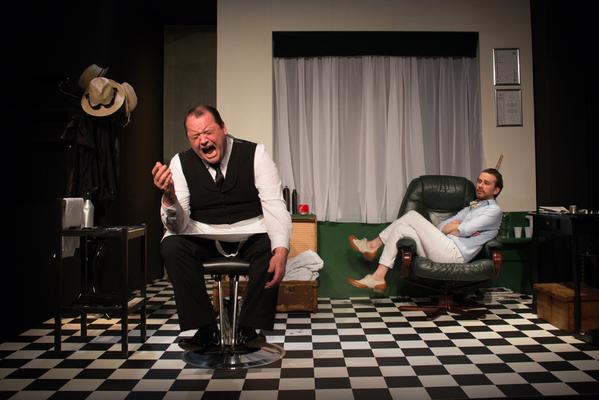Much like an enthralling cinema experience when you consequently fail to reach the bottom of your popcorn, when a production at The Other Room comes to a close and you still have half a pint left, it is a sure sign that the performance has won you over. Set in a barber’s shop in just one act with two actors, the second production in the ‘Life in Close Up’ season is every bit as challenging as Sarah Kane’s brutal ‘Blasted’.

Leander Deeny and Christian Patterson
Credit: Pallasca photography
Specifically inspired by Thucydides’s account of the destruction of the Sicilian expedition during the Peloponnesian War when the navy and the Athenian army suffers a merciless and colossal defeat, Howard Barker’s The Dying of Today is an unfettered examination of that anxiety induced moment of inevitability, considering the worst case scenario and discovering how we are meant to process the phenomenon that is ‘bad news’.
Director Kate Wasserberg’s attention to detail is meticulous; the elegant transactions between the two characters allow both the bearer and hearer to feed off one another’s energy. Once again, she shatters the fourth wall and this time the audience becomes the mirror. We are the onlookers of this intimate moment, fittingly captivated in anticipation of the bad news ourselves and whilst this relates to an historical event, the scenario is timeless. Is it not reminiscent of how we respond to the sensationalist media of today? Even as a child I remember the moment that the 9/11 news hit and I can picture what I was doing and how the news was delivered of the London Bombings by the school librarian in an English lesson.
Dressed for a holiday with a touch of Hollywood glamour, the lonely traveller Leander Deeny as the bearer of bad news is quirky and charismatic. In his opening speech he wittingly and superficially luxuriates in the imminent moment of revealing the earth-shattering broadcast. The pleasure that the bearer gets as he revels in his artistry or in this case, the barber’s emotionally charged telling is both comical and curiously unsettling. As the revelation is played out, Christian Patterson demonstrates his versatility as an actor. Far from the grossly abhorrent character in Blasted, the barber’s experimentation with grief and revelation is incredibly intuitive and calls out for sympathy. The outbursts of overwhelming sorrow and emotionally charged rage were chilling yet the barber maintains dignity and has a tenderness that even manages to reach the most misunderstood bearer as fleeting moments of compassion break through his cold exterior.
In the final five minutes as the resigned barber returns his dismantled shop to the picture of normality, the artistry is at its best. The amalgamation of music and the symbolic play on the chess board set is profoundly moving and perfectly sums up Barker’s tragic poetry.
Get The Chance has a firm but friendly comments policy.
